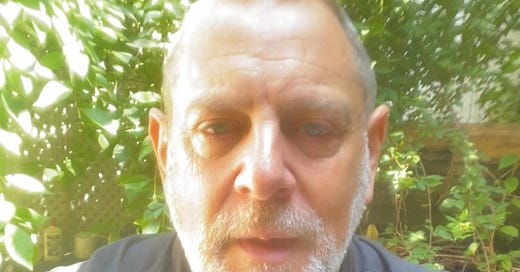Playback speed
×
Share post
Share post at current time
Share from 0:00
0:00
/
0:00
Chronicles 3? Tough Times of Biblical Proportions
Weekly Vid Recap of Below the Bible Belt
Jun 20, 2025
These are tough times of trauma for so many people in so many places.
I hear people saying these are troubled times of biblical proportions. What does that even mean?
I was just on the phone with my sister, she in her home near Tel Aviv, I’m at home in NYC, as sirens came on there, louder and longer than usual, and a loud thud was heard nearby. Even on the phone -- She’s ok - brave and resilient - - didn’t have a chance to get out to the shelter, with a walker it takes her too long. Many others are not ok. And it’s just another day, of another war, in what now seems endless war that is expanding regionally and maybe globally. What does it mean that these troubled times are of biblical proportions?
A podcast title caught my eye this week - Chronicles 3 - a group of Israeli rabbis and thinkers at the Shalom Hartman Institute debated whether a new chapter is being added right now to the bible - picking up where the Persian-Jewish relations were last recorded in the two books of Chronicles that were chosen to end the Bible. On some crazy level today’s headlines pick up the story 2,500 years after Cyrus the Great, Persian emperor hailed as the founder of what is now Iran, was also hailed by the bible as ‘the messiah’ and the king who enabled the return to Zion and the creation of second temple Judaism? These two ancient civilizations are now at each other’s throats as religious zealots manipulate armed forces and millions of people’s freedom and life is at stake. Biblical proportions?
On American TV, two Christian men debated the bible’s decisive role in shaping American public policy on supporting Israel. Did you catch the Ted Cruz Tucker Carlson debate? Not my usual newsfeed -You can check it out here - but what’s astonishing is not just that these influential power broker hawks demonstrate the dangerous fusion of faith-based simplification of complexities with political power but also show us how biblical verses have been and still are used and abused to justify or challenge contemporary choices - including waging a war. For as long as these biblical verses were around people like these two guys debate their practical meaning. In this case - does a verse from Genesis demand support of the Jewish people - or the State of Israel, and why this matters at all and may impact US escalation of this conflict.
It’s definitely a crucial moment in understanding extremism in the making - then, and now - in all religious arenas.
But there’s good news here too.
What I’m finding encouraging in this close reading of Chronicles below the bible belt - is the evidence of resistance, and the voices of protest, persisting to fight for a more moral voice - despite the forceful agenda of the biblical editors and all those who still prefer tribalism and stern divisions over more human first messy middles where there’s more fluidity of identities and enough empathy to go around.
This past week in Chronicles we read the carefully curated story of King David’s rise to power and the build up of the House of David in Jerusalem, 3,000 years ago.
David removes the northern tribes from power and moves the center to Jerusalem, where the Judean rule has risen. Brutal battles will define the city and the kingdom’s growing size and the decisive move is to bring the most important religious relic to the new capital city. David brings the ark of the covenant, first failing, but then finally, with a big shiny parade and the band of Levities making big music -- to the new Temple Mount. It’s an act of centralization of the tribal traditions and claiming of crown. But not everybody is on board. A lone voice of protest and resistance is mentioned in these chapters - Michael, the Queen, Daughter of Saul, First King of the North, looks out the window and scorns her husbands with a look that could kill. It’s in the text. What’s important to notice is that the authors of Chronicles took out the words she said - those are mentioned in the other version of the Book, in Samuel 2. In that version she really mocks him for his pretentiousness to the throne. This is not a domestic dispute -- this is political resistance. The voice of the north is heard in the palace of the south and the queen talks back to the king in defiance. Her words might have been silenced by the writers of Chronicles but her resistance remains - a role model for us who stand up to tyranny and the potentially toxic fusion of political and religious agenda and leadership. Michal reminds us to risk protest and not to silence resistance whatever the price.
The bible we inherited contains both seeds of the more fundamentalistic religious approach to life, with us vs. them supremacist mentality yet also the seeds of the love first, human first, moral voice of the religion, a both/and approach that hallows every human life. It includes both David and MIchal -- and it’s not a zero sum game and they are both much more complex characters than that. But in this story are threads that can help us navigate ahead with more awareness of nuance, and more attention to the hope of humanity over discord and hubris.
To read Chronicles, carefully curated and chosen by the biblical authors/editors as the grand finale - is to recognize the origins of our discontent - and how the winning camp of rigid religiosity with territorial claims got to tell the story that is in the book - yet also left us enough clues and content that remind us that there always was a fierce and lively opposition. It’s not easy to detect the anti-establishment voices in Chronicles - but a close reading digs them up.
To read these verses that echo still of courage, that value protest and progress, to hear these ancient ripples at this time of loud pundits, brutal war and religious-political extremism that pits people against each other instead of letting love, empathy, pride and justice lead -- is a bit of hope.
After I spoke with my sister I also called my other siblings and friends to check in. One of my brothers walked me to the small orchard he’s been planting behind in his Galilean home. There’s the grapevine growing, and here’s the fig tree, and I’m sitting under both right now, as also some kind of shelter, he joked. And this old biblical trope of hope - simple fruit on a summer day into a shabbat of fear that could be so much simpler -- that too was a smile and resistance, and hope.
May all people everywhere be safe, be fed, be held and be strong. May peace prevail.
Thank you for joining me below the bible belt. Our journey continues.
Shabbat Shalom.
Recent Posts











Share this post